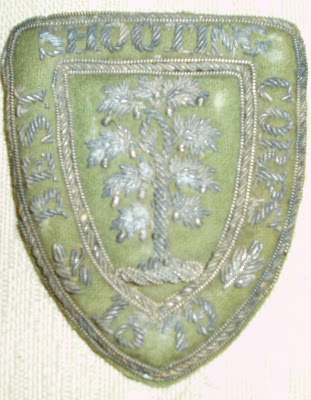Severn River with Worcester Cathedral in the background
From his first day at Royal Worcester, James' goal was to be a skilled worker so it seems clear he had made an early commitment to self advancement, an important Victorian value. Further evidence of this is seen in that even though his formal education ended at age 10, he was back in school at 16, most likely as an evening student, studying free-hand drawing at the Worcester School of Art. At a time when the typical working day was 12 hours a day, six days a week, almost any outside activity like night school was indicative of someone committed to more than survival. However, James Winder's outside activities went far beyond personal self advancement.
Training the Volunteers
Why James joined a military unit in addition to long work days, family responsibilities and part time schooling is a fascinating question with only speculative answers. James did have the example of his father's long military service (most of which was spent in what was known as the Worcestershire Regiment) and also his grandfather, Thomas Window (1768-1841) who apparently served in the local militia during the Napoleonic Wars. In addition the volunteers were a popular activity for middle or upper working class young men. Regardless, however whether it was due to paternal example or a variety of personal reasons, over a decade of military service, even if part time, is not something one takes on without some sense of responsibility and commitment.
One of many newspapers articles noting James participation in rifle competition
Throughout his volunteer service, James was a member of the 14th Company (later Company B) of the 2nd Volunteer (Rifle) Battalion of the Worcestershire Regiment. Each company consisted of two officers, six sergeants and 100 enlisted men with the 14th being one of two companies in the city of Worcester. While the regiment met periodically for drill and spent time in an annual summer encampment, James major involvement appears to have been competing for the company rifle team in both local and regional contests. Typically competition consisted of seven shots per man at targets 200 and 500 yards away, most likely with an Enfield muzzle loading rifle musket. Supposedly some of the more competitive volunteers purchased better quality rifles, no evidence survives as to whether James took things to that level. Among the contests was competition for tradesman's prizes (item donated by local businesses) where on different occasions James won a hat, an inkstand, a vest, a glass jar and a tobacco jar.
Patch reads - "Best Shooting Corps, 1879"
"Oh Maggie, Maggie May, they've taken you away
They've sent you to Van Diemen's cruel shore
For you've robbed so many a sailor, and skinned so many a whaler
And you'll never never shine in Lime Street no more"
Last stanza of "Maggie May," a traditional 19th Century Liverpool Seamen's Song.
There was also a connection between Forester's dinners and James' military service. Each Foresters' dinner featured a series of toasts and responses and on at least three occasions James responded to a toast to the "volunteers," further evidence that he was both self-confident and articulate. At the 1881 dinner, James told the assembled guests he "had no doubt they would be able, as volunteers, to do their duty if called upon." Eventually James was elected to a leadership position in the Foresters, serving right up until his 1891 immigration. Exactly how James became involved in the Ancient Order of Foresters is unknown, but one very suggestive clue survives. Also present at the 1878 dinner was one James Hudson, who just happened to be James Winder's new father-in-law!
Inscription reads - "Won by J. Winder, September 1880.






No comments:
Post a Comment